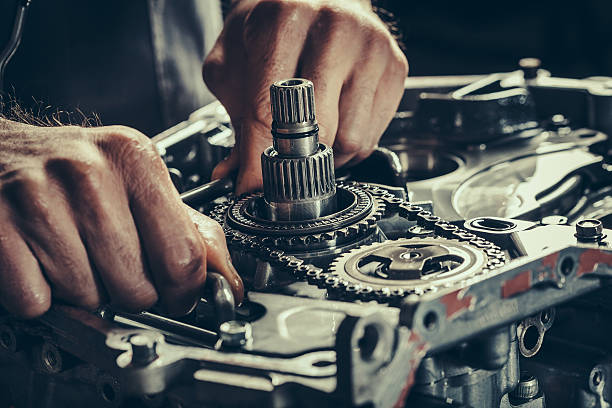Remanufactured Car Engines - Quality and Cost Information Guide
Remanufactured car engines offer drivers a cost-effective alternative to new engine replacements while providing reliable performance. These engines undergo a thorough reconditioning process where worn components are replaced or restored to meet specific quality standards. Understanding the quality indicators, cost factors, and benefits of remanufactured engines can help vehicle owners make informed decisions when facing major engine repairs.

Remanufactured car engines represent a significant segment of the automotive aftermarket, providing vehicle owners with a reliable alternative to both new engines and used engines. Unlike simply used engines that may have unknown histories, remanufactured engines undergo a standardized process where they are disassembled, cleaned, inspected, and rebuilt with new or reconditioned parts to meet specific performance standards. This comprehensive guide explores the quality aspects, cost considerations, and benefits of choosing remanufactured engines for your vehicle.
Quality Standards in Remanufactured Car Engines
The quality of remanufactured car engines depends largely on the thoroughness of the remanufacturing process. Reputable remanufacturers follow strict quality control protocols that include complete disassembly, thorough cleaning of all components, and precision machining. Critical parts such as crankshafts, camshafts, and cylinder heads are inspected using specialized equipment to detect microscopic flaws. Components that don’t meet factory specifications are either reconditioned or replaced with new parts. The best remanufactured engines include updated components that address known weaknesses in the original design, potentially offering improved reliability over the original engine.
Quality indicators to look for include warranty coverage (typically 1-3 years), adherence to OEM specifications, and certification from industry associations. Engines remanufactured in facilities with ISO certification often demonstrate consistent quality standards. Many reputable remanufacturers also perform dyno testing on completed engines to verify performance before shipping.
Cost and Price Factors for Remanufactured Engines
Remanufactured car engines typically cost 30-50% less than new engines while offering similar reliability. Several factors influence the final price of a remanufactured engine:
Engine complexity and design play significant roles in determining cost—V8 and diesel engines generally cost more than four-cylinder gasoline engines due to their complexity and the number of components involved. The vehicle make and model also impact pricing, with luxury and performance vehicle engines commanding premium prices due to specialized components and tighter tolerances.
Labor costs vary by region and facility, affecting the final price. Additionally, the extent of remanufacturing—whether it’s a “short block” (basic engine block with minimal components) or a complete “long block” with all accessories—significantly impacts the total investment required.
Remanufactured Car Engines Providers and Dealers
The remanufactured engine market includes various providers ranging from national corporations to local rebuilders. When selecting a provider, it’s important to consider their reputation, warranty terms, and quality control processes.
| Provider | Specialization | Warranty | Price Range |
|---|---|---|---|
| Jasper Engines | Domestic & Import | 3-year/100,000 miles | $2,500-$4,500 |
| ATK Engines | Domestic focus | 3-year/unlimited miles | $2,200-$4,000 |
| AutoZone (supplier) | Various brands | 3-year/unlimited miles | $1,800-$3,800 |
| Ford Remanufactured | Ford vehicles | 3-year/unlimited miles | $3,000-$5,500 |
| Dahmer Powertrain | GM specialists | 3-year/100,000 miles | $2,800-$4,200 |
Prices, rates, or cost estimates mentioned in this article are based on the latest available information but may change over time. Independent research is advised before making financial decisions.
When choosing a provider, consider factors beyond just price. Established remanufacturers with dedicated facilities often provide more consistent quality than smaller operations. Many providers offer installation services or can recommend certified mechanics familiar with their products. Some also provide technical support and documentation to ensure proper installation and break-in procedures.
Benefits of Choosing Remanufactured Car Engines
Remanufactured engines offer numerous advantages beyond cost savings. One significant benefit is environmental sustainability—remanufacturing consumes substantially less energy and raw materials compared to new engine production. A typical remanufactured engine saves approximately 85% of the energy required to produce a new one while diverting valuable materials from landfills.
From a performance perspective, remanufactured engines often incorporate engineering improvements that address known weaknesses in original designs. These updates can enhance reliability, efficiency, and sometimes even power output compared to the original engine specifications. Many remanufactured engines also include new components for critical systems like oil pumps and timing chains, reducing the likelihood of these common failure points causing problems.
The warranty protection provided with remanufactured engines offers peace of mind that’s typically unavailable with used engines. Most reputable providers back their products with warranties comparable to those for new engines, demonstrating confidence in their quality standards.
Installation Considerations and Long-Term Value
Proper installation is crucial for maximizing the lifespan of a remanufactured engine. Professional installation helps avoid issues like improper torque specifications or alignment problems that could lead to premature failure. Many engine failures are caused by external factors like cooling system problems or oil starvation, so addressing these systems during installation is essential for long-term reliability.
Following manufacturer-recommended break-in procedures is equally important. This typically involves avoiding heavy loads and high RPMs for the first 500-1,000 miles while varying engine speeds to properly seat piston rings. Using high-quality oil and changing it after the initial break-in period helps remove any manufacturing debris and ensures proper lubrication.
From a long-term value perspective, remanufactured engines often represent the best balance between cost and reliability. While a used engine might cost less initially, its unknown history and lack of warranty protection create significant risk. Conversely, new engines offer maximum reliability but at substantially higher prices that may exceed the vehicle’s value in older cars.
Remanufactured car engines provide a practical solution for extending vehicle life without the premium cost of new components. By understanding quality indicators, cost factors, and selecting reputable providers, vehicle owners can make informed decisions that balance performance needs with budget constraints.




